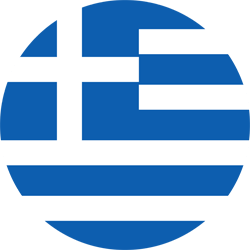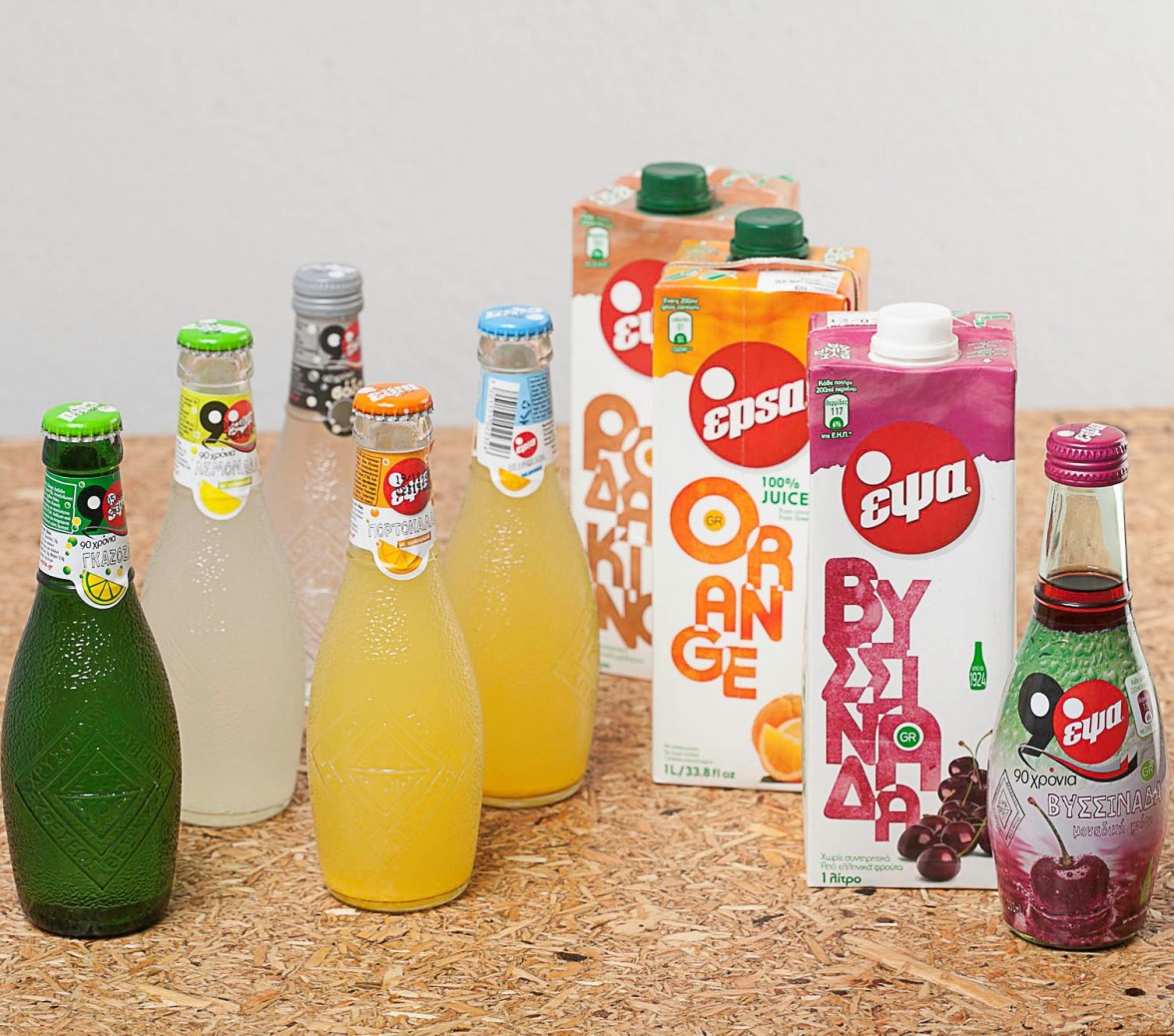[:el]
Once upon a time, there were the lemonitzidika, the traditional Greek shops selling fresh lemonade drink. Many decades ago, small industries used to produce refreshment and soft drinks, like lemonade, orangeade and lemon soda in every town of Greece. Currently, during the Facebook and mobile Internet era, black and white photos portraying wooden boxes and glass bottles look like fantasy settings. Actually, there are still companies today that dwell on the value of tradition, following the same old recipe in producing refreshment drinks. One of these companies is EPSA, located at Agria of Volos.
The history of EPSA dates back to 1924, an era of lemon surplus in the agricultural area of Pelion. At that time, brothers Kosmadopoulos were working as bankers, but inspired by the rapidly increasing numbers of refreshment drinks shops and sales of traditional lemonade drinks by door-to-door hucksters, they both decided to build up their own refreshment drinks production unit. A German chemical engineer, named Otto, was invited to contribute to the production of lemonade. The popular EPSA secret recipe was born during that time and it currently remains identical to that of past years. Thus, the Agria’s Refrigerator Company, later EPSA, changed its venture field from food preservation and ice production (the ice production company operated up to 1969) to refreshment drinks production. At the same time, the company was also the major distributor of power supply for the whole area.
A lot of things have happened over these last nine decades. In 1937, EPSA earned the Gold Quality Award at the International Trade Fair of Thessaloniki. In 1940, the outstanding EPSA glass bottle was designed, destined to become the trademark of the refreshment drinks company of the city of Volos. In the meantime, company’s ownership was taken over by the National Bank of Greece and in 1969 EPSA was bought out by brothers Moskahlaidis and Nikos Tsaoutos.
Fresh investment initiative rapidly increased the production rate to 20,000 bottles per hour. New flavours and several packaging items were added to the EPSA product lines. Following EPSA’s communication booming in Greece during the ‘90s, the brand’s positioning at the A-B Vassilopoulos and Sklavenitis supermarkets updated the image of the superior quality product and formed the foundation to later expand distribution beyond the boundaries of Thessalia.
Currently, EPSA operates from the same facilities at Agria of Volos, with modern refreshment production lines and methods. The building premises that house EPSA’s operations follow the traditional Pelion architecture line and stand in perfect harmony with the housing environment of the area. The water used in EPSA’s refreshment drinks production naturally springs from Agria’s soil. EPSA applies systems of quality control ISO 9001:2008 and ISO 22000 and guarantees premium product quality. During the last years, next to EPSA’s classic refreshments drinks, like orangeade, lemonade, lemon soda and soda water, EPSA added new products, like lemon cola, sour cherry drink, tonic water, light ice tea with stevia plant sweetener in three flavours, bio orangeade and lemonade, light frizzy lemonade with stevia plant sweetener, light fizzy orangeade with stevia plant sweetener and light drops (sweetener from stevia plant in liquid form). EPSA’s refreshments are sold in glass bottles, aluminum cans and PET plastic bottles. Moreover, the line is enriched with fruit juices in TetraPak packaging.
EPSA’s products are a sold out in supermarket and are distributed in several prestigious selling points. Moreover, new selling points are created on a regular basis and EPSA’s future is very promising. The philosophy is different!
The Book of EPSA’s History continues to be written in big chapters. The story’s heroes are the intuitive businessmen, inspired to brand and market the Greek traditional lemonade drink, the creative people communicating the product, the area’s residents that have fun producing for EPSA and the area of Agria that inspires strong bonds with traditional values and opens up promising future horizons.
VISION/GOALS
What makes EPSA unique is management’s intuition to turn the value of tradition into a modern concept. Having excelled over the years, EPSA continues to top the refreshment drinks market by traditionally ensuring superior quality products.
IMPORTANT DATES
1924: Brothers Ioannis and George Kosmadopoulos founded Agria’s Refrigerator Company S.A. at Agria of Volos.
1936: The company’s ownership was taken over by the National Bank of Greece, which later founded the company New Agria’s Refrigerators S.A.
1970: The company’s ownership passed to the hands of brothers Moschahlaidis and Nikos Tsaoutos, who invested in new machinery and modern facilities.
1987: The first Greek Cola Drink was produced by EPSA.
1989: EPSA brought in the 330 ml aluminum can production line.
1994: EPSA introduced long life fruit juices to the market.
1996: The first Lemon Cola Drink was produced by EPSA.
1997: The first Ice Tea Drink with Lemon Juice was produced by EPSA, currently the only ice tea drink containing lemon juice.
2003: EPSA produced the Sour Cherry Drink, sold in a glass bottle bearing a heat shrink label.
2005: EPSA marketed the new Peach Ice Tea Drink.
2006: The Three Dew Rangers of EPSA earned the company a creativity award for educating children on recycling.
2008: EPSA’s participation to the European Equal Program was awarded for best cooperation practice of private and public sector and was introduced to Brussels.
2009: The first Pomegranate and Sour Cherry Ice Green Tea was produced by EPSA.
2011: EPSA Ice Tea Drink packaging earned the brand the Gold Label Award during the 1st Product Labeling Contest at the National Research Institute.
2011: EPSA produced the first Greek bio refreshment drinks.
2012: EPSA produced the first Greek refreshment drinks with natural stevia plant sweetener.
AWARDS/ACHIEVEMENTS
1937: EPSA Lemonade received the Gold Quality Award at the International Trade Fair of Thessaloniki.
2008: TÜV HELLAS awarded EPSA with special honours for quality management.
2010: Strongest Companies 2010 – ICAP
2011: Strongest Companies 2011- ICAP
2012: EPSA’s Organic Lemonade was named Product of the Year by Food and Drink magazine.
2012: EPSA was a winner in the Self Service magazine Excellence Awards.
2012: Corporate Superbrands Greece 2011-12
2012: iTQi EPSA’s Green Tea with Pomegranate and Sour Cherry, 1 Golden Star
2012: iTQi EPSA’s Bio Lemonade, 2 Golden Stars for Superior Taste
2012: EPSA ranked 2nd at the Famous Brands 2012, Greece
2012: EPSA won the Gold Award for 88 years of corporate presence in the Greek market.
2012: Best Launches Award 2012, EPSA Light Lemonade with stevia plant sweetener and EPSA Light Carbonated Orangeade with stevia plant sweetener.
2012: Environmental Awards 2013, Best Practice in the category Water Stewardship-Water Conservation.
[:en]
Once upon a time, there were the lemonitzidika, the traditional Greek shops selling fresh lemonade drink. Many decades ago, small industries used to produce refreshment and soft drinks, like lemonade, orangeade and lemon soda in every town of Greece. Currently, during the Facebook and mobile Internet era, black and white photos portraying wooden boxes and glass bottles look like fantasy settings. Actually, there are still companies today that dwell on the value of tradition, following the same old recipe in producing refreshment drinks. One of these companies is EPSA, located at Agria of Volos.
The history of EPSA dates back to 1924, an era of lemon surplus in the agricultural area of Pelion. At that time, brothers Kosmadopoulos were working as bankers, but inspired by the rapidly increasing numbers of refreshment drinks shops and sales of traditional lemonade drinks by door-to-door hucksters, they both decided to build up their own refreshment drinks production unit. A German chemical engineer, named Otto, was invited to contribute to the production of lemonade. The popular EPSA secret recipe was born during that time and it currently remains identical to that of past years. Thus, the Agria’s Refrigerator Company, later EPSA, changed its venture field from food preservation and ice production (the ice production company operated up to 1969) to refreshment drinks production. At the same time, the company was also the major distributor of power supply for the whole area.
A lot of things have happened over these last nine decades. In 1937, EPSA earned the Gold Quality Award at the International Trade Fair of Thessaloniki. In 1940, the outstanding EPSA glass bottle was designed, destined to become the trademark of the refreshment drinks company of the city of Volos. In the meantime, company’s ownership was taken over by the National Bank of Greece and in 1969 EPSA was bought out by brothers Moskahlaidis and Nikos Tsaoutos.
Fresh investment initiative rapidly increased the production rate to 20,000 bottles per hour. New flavours and several packaging items were added to the EPSA product lines. Following EPSA’s communication booming in Greece during the ‘90s, the brand’s positioning at the A-B Vassilopoulos and Sklavenitis supermarkets updated the image of the superior quality product and formed the foundation to later expand distribution beyond the boundaries of Thessalia.
Currently, EPSA operates from the same facilities at Agria of Volos, with modern refreshment production lines and methods. The building premises that house EPSA’s operations follow the traditional Pelion architecture line and stand in perfect harmony with the housing environment of the area. The water used in EPSA’s refreshment drinks production naturally springs from Agria’s soil. EPSA applies systems of quality control ISO 9001:2008 and ISO 22000 and guarantees premium product quality. During the last years, next to EPSA’s classic refreshments drinks, like orangeade, lemonade, lemon soda and soda water, EPSA added new products, like lemon cola, sour cherry drink, tonic water, light ice tea with stevia plant sweetener in three flavours, bio orangeade and lemonade, light frizzy lemonade with stevia plant sweetener, light fizzy orangeade with stevia plant sweetener and light drops (sweetener from stevia plant in liquid form). EPSA’s refreshments are sold in glass bottles, aluminum cans and PET plastic bottles. Moreover, the line is enriched with fruit juices in TetraPak packaging.
EPSA’s products are a sold out in supermarket and are distributed in several prestigious selling points. Moreover, new selling points are created on a regular basis and EPSA’s future is very promising. The philosophy is different!
The Book of EPSA’s History continues to be written in big chapters. The story’s heroes are the intuitive businessmen, inspired to brand and market the Greek traditional lemonade drink, the creative people communicating the product, the area’s residents that have fun producing for EPSA and the area of Agria that inspires strong bonds with traditional values and opens up promising future horizons.
[:]



